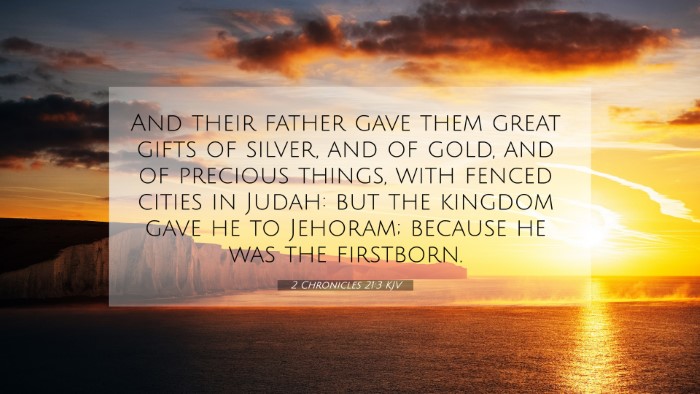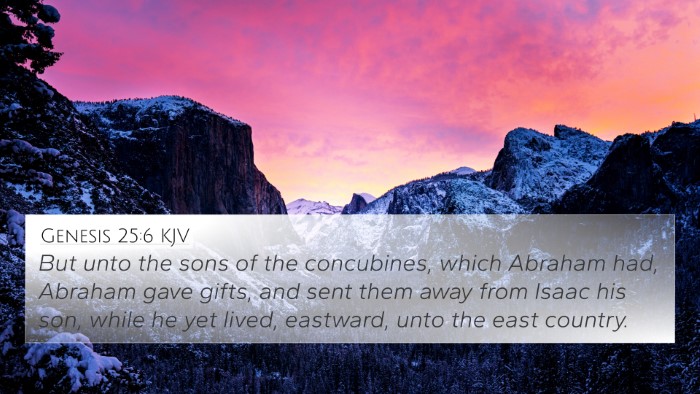Understanding 2 Chronicles 21:3
2 Chronicles 21:3 states, “Their father gave them many gifts of silver and gold and valuable articles, together with fortified cities in Judah. But he gave the kingdom to Jehoram because he was the firstborn.” This verse elucidates the priorities of King Jehoshaphat and how he distributed his wealth and responsibilities among his sons.
In exploring the meaning of this verse, we can draw insights from prominent public domain commentaries such as those by Matthew Henry, Albert Barnes, and Adam Clarke, which provide a deeper understanding of the historical and theological context.
Commentary Insights
Matthew Henry's Commentary
Matthew Henry reflects on the provision made by Jehoshaphat for his sons. He emphasizes that the gifts were abundant and varied, designed not just to enrich the sons materially but also to prepare them for potential leadership roles.
This highlights a father's duty to equip his children, showcasing the importance of preparation and responsibility in familial relationships. Henry also infers a theological connection, linking the idea of inheritance—both material and spiritual—to the broader Christian concept of inheritance through Christ.
Albert Barnes' Commentary
Albert Barnes elaborates on the significance of Jehoram being the firstborn. He points out that in ancient Israelite culture, the firstborn son typically received a larger share of the inheritance, which emphasizes the meritocratic aspect of leadership within the family structure.
Barnes also notes that the blessings bestowed upon Jehoram may serve as both a privilege and a burden, highlighting the expectation of leading the kingdom with justice and divine favor.
Adam Clarke's Commentary
Adam Clarke points out the implications of the gifts mentioned in the verse. He emphasizes that the "fortified cities" allotted to the other sons represent not merely physical fortifications but symbolize the spiritual and moral strength required of leaders.
Clarke connects this to a broader theme in Scripture about the necessity of preparation for leadership roles, drawing connections to other Biblical leaders who also received significant preparation and gifting from God and their parents.
Cross References for 2 Chronicles 21:3
- 1 Chronicles 5:1-2 - Discussion of the birthright and leadership roles within the family.
- Deuteronomy 21:15-17 - Laws regarding inheritance rights for the firstborn.
- 2 Samuel 8:14 - The establishment of kingly authority and wealth.
- Proverbs 13:22 - A good person leaves an inheritance for their children's children.
- 1 Kings 1:5 - The implications of being a firstborn and aspiring to kingship.
- 1 Chronicles 28:4 - God's choice of Solomon over others for leadership.
- Hebrews 12:16 - A reference to Esau, the firstborn who despised his birthright.
Thematic Connections
This verse not only provides insight into the familial and cultural dynamics of ancient Israel but also underscores wider Biblical themes such as:
- Leadership and Responsibility: The responsibilities that come with inheritance.
- Divine Favor: The necessity of God's favor in leadership roles.
- Family Dynamics: The importance of appropriate familial relationships in the context of governance.
- Wealth and Spirituality: The relationship between material wealth and spiritual duties.
Tools for Bible Cross-Referencing
Understanding the connections between this verse and others enhances our comprehension of Scripture. Various tools for Bible cross-referencing can be used to deepen study:
- Bible Concordance: Identifying specific passages and their contexts.
- Bible Cross-Reference Guide: Facilitating easier access to related Scriptures.
- Bible Reference Resources: Aiding deeper study and insights.
Conclusion
In summary, 2 Chronicles 21:3 offers profound insights into the nature of leadership and family responsibility within the framework of biblical history. The comments provided by Matthew Henry, Albert Barnes, and Adam Clarke bring out rich theological implications intertwined with the verse.
By exploring the provided Bible verse cross-references, readers can engage in meaningful study and obtain a thorough understanding of the connections between various Bible verses, thus fostering a deeper appreciation of the narrative and thematic elements present in the Scriptures.






